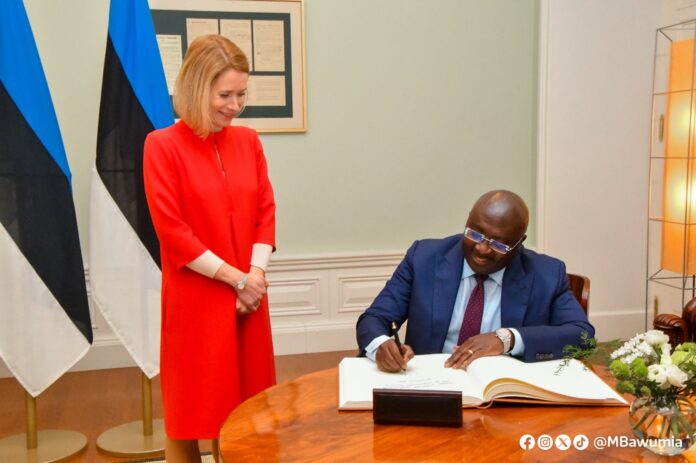Authorities of the world’s most digitalised country, Estonia, have expressed surprise at the success story of Ghana’s digitalisation journey, and the impact it is having on the Ghanaian society.
Vice President Dr. Mahamudu Bawumia is on a working visit to the northern European country, which has carved a niche for itself as a global leader in digitalisation with 99 per cent of its public services delivered online, including an incredible 98 per cent of online banking transactions.
Ghana, in the past seven years, has also become a reference point for digitalisation in Africa, having built a world-standard digitalisation network, with a digital national identity system, a nationwide property address system, as well as an interoperable database and financial sector, to underpin the delivery of many public services online.
During meetings with high-ranking officials of Estonia, Ghana’s remarkable digitalisation story was discussed at length, and hailed for its impact within a short period.
“It has taken us over 20 years to get to where we are now, but you have done so well and you have achieved a lot in seven years,” said Estonia’s Chief Government Information Officer, Luukas Ilves, who is also Undersecretary for Digital Transformation.
KT Hammond is an analogue politician trying to find relevance in a digital world – Ivan Kyei
Luukas Ilves also expressed surprise when Vice President Bawumia told him that all of Digital Ghana’s platforms were built by local talents from Ghana.
The Estonian official asked Dr. Bawumia which countries have been building Ghana’s digital platforms, and he was surprised when the Vice President answered that all the digital initiatives have been made possible through the ingenuity of young Ghanaians.
“The talent is local. It is right in Ghana. Everything we have done have been done by young, talented Ghanaians back home and they have been so efficient that I could call them at midnight for a discussion on projects,” he lauded.
In spite of the long gap in years of implementation; over 20 years for Estonia and 7 years in Ghana, Estonia’s digitalisation framework and output is similar to Ghana’s as both are anchored on a digital national identity system.
In Estonia, every digital initiative operates on the national identity card, managed by the Civic Registry, just as Ghana’s digital interventions are operated through the Ghanacard, managed by the National Identification Authority.
Again, Estonia’s unique national identification number, also serves as tax identification, social security, drivers license and other national identification numbers, just as the Ghanacard number serves as identification numbers for SSNIT, health insurance and others.
Ghana has also achieved the convergence of public services online through the Ghana.Gov, just as Estonia, whose online public service delivery is called e-Government.
However, contrary to Ghana’s digitalisation initiative, which has faced pessimism from a section of the public as it gets rid of corrupt practices, the situation is different in Estonia as their digital journey has received support, especially from the private sector.
“We have received tremendous support in this mission, especially from the private sector,” said the Chief Government Information Officer, also adding that the banks supported them so much for online banking, when they sensed they could be out of business.
As a result, about 98% of banking transactions in Estonia are now done online.
Dr. Bawumia is leading a Ghanaian delegation for a three-day working visit to Estonia.
On the first day of his visit on Wednesday, he held bilateral discussions with the President and Prime Minister of Estonia.
Digital Ghana meets e-Estonia as Bawumia holds talks with Estonia President, PM













